J. Bradford DeLong's Blog, page 381
April 4, 2018
Memo to Self: Now that John Williams is heading to become...
Memo to Self: Now that John Williams is heading to become President of the Federal Reserve Bank of New York and Vice Chair of the Federal Open Market Committee, who should take his place as President of the Federal Reserve Bank of San Francisco?
Mary Daly?
Christie Romer?
Glenn Rudebusch?
Thinking outside the box, Takeo Hoshi?
Thinking way outside the box, Enrico Moretti?
Thinking way way outside the box, Raj Chetty?
Ideal candidates should I think, be in their early 50s, and should be prepared to lead an analytical and operations orientation of the San Francisco Federal Reserve Bank toward one or more of:
Financial system safety-and-soundness regulation
Financial system consumer finance regulation
Asia and its place in the global financial system
Tech and its place in the global financial system
Regional economic development issues..
April 3, 2018
Another April Fools Post: Leszek Kolakowski Tells E.P. Thompson Exactly What He Thinks of Him

Should-Read: Leszek Kolakowski (1974): Main Currents of Marxism: "http://socialistregister.com/socialistregister.com/files/SR_1974_Kolakowski.pdf: Your letter contains some personal grievances and some arguments on general questions...
...I will start with a minor personal grievance. Oddly enough, you seem to feel offended by not having been invited to the Reading conference and you state that if you had been invited you would have refused to attend anyway, on serious moral grounds. I presume, consequently, that if you had been invited, you would have felt offended as well and so, no way out of hurting you was open to the organizers.
Now, the moral ground you cite is the fact that in the organizing Committee you found the name of Robert Cecil. And what is sinister about Robert Cecil is that he once worked in the British diplomatic service. And so, your integrity does not allow you to sit at the same table with someone who used to work in British diplomacv.
0, blessed Innocence!
You and I, we were both active in our respective Communist Parties in the 40s and 50s which means that, whatever our noble intentions and our charming ignorance (or refusal to get rid of ignorance) were, we supported, within our modest means, a regime based on mass slave labour and police terror of the worst kind in human history. Do you not think that there are many people who could refuse to sit at the same table with us on this?
No, you are innocent, while I do not feel, as you put it, the "sense of the politics of those years" when so many Western intellectuals were converted to Stalinism.
Your "sense of politics of those years" is obviously subtler and more differentiated than mine, I gather this from your casual comments on Stalinism:
First, you say, that a part (a part, I do not omit that) of responsibility for Stalinism lies upon the Western powers.
You say, second, that "to a historian, fifty years is too short a time in which to judge a new social system, if such a system is arising".
Third, we know, as you say, "times when communism has shown a most human face, between 1917 and the early 1920s and again from the battle of Stalingrad to 1946"....
Your second comment is revealing, indeed. What is fifty years "to a historian"?
The same day as I am writing this, I happen to have read a book by Anatol Marchenko, relating his experiences in Soviet prisons and concentration camps in the early 1960s (not 1930s).... The author, a Russian worker, was caught when he tried to cross the Soviet border to Iran... in Khrushchev's time, when the regrettable errors of J. V. Stalin were over (yes, regrettable, let us face it, even if in part accounted for by the Western powers), and so, he got only six years of hard labour in a concentration camp.
One of his stories is about three Lithuanian prisoners who tried to escape from the convoy in a forest. Two of them were quickly caught, then shot many times in the legs, then ordered to get up which they could not do, then kicked and trampled by guards, then bitten and torn up by police dogs (such an amusement, survival of capitalism) and only then stabbed to death with bayonets. All this with witty remarks by the officer, of the kind "Now, free Lithuania, crawl, you'll get your independence straight off!"
The third prisoner was shot and, reputed to be dead, was thrown under corpses in the cart; discovered later to be alive he was not killed (de-stalinization!) but left for several days in a dark cell with his festering wound and he survived after his arm was cut off.
This is one of thousand stories you can read in many now available books. Such books are rather reluctantly read by the enlightened Leftist elite, both because they are largely irrelevant, they supply us only with small details (and, after all, we agree that some errors were committed) and because many of them have not been translated (did you notice that if you meet a Westerner who learnt Russian you have at least 90% chance of meeting a bloody reactionary? Progressive people do not enjoy this painful effort of learning Russian, they know better anyway).
And so, what is fifty years to a historian? Fifty years covering the life of an obscure Russian worker Marchenko or of a still more obscure Lithuanian student who has not even written a book? Let us not hurry with judging a "new social system". Certainly I could ask you how many years you needed to assess the merits of the new military regime in Chile or in Greece, but I know your answer: no analogy, Chile and Greece remain within capitalism (factories are privately owned) while Russia started a new "alternative society" (factories are state owned and so is land and so are all its inhabitants). As genuine historians we can wait for another century and keep our slightly melancholic but cautiously optimistic historical wisdom.
Not so, of course, with "that beast", "that old bitch, consumer capitalism" (your words). Wherever we look, our blood is boiling. Here we may afford to be ardent moralists again and we can prove--as you do--that the capitalist system has a "logic" of its own that all reforms are unable to cancel. The national health service, you say, is impoverished by the existence of private practice, equality in education is spoilt because people are trained for private industry etc.... And you propose "a peaceful revolutionary transition to an alternative socialist logic". You think apparently that this makes perfectly clear what you mean; I think, on the contrary, that it is perfectly obscure unless, again, you imagine that once the total state ownership of factories is granted, there remain only minor technical problems on the road to your utopia.
But this is precisely what remains to be proved and the onus probandi lies on those who maintain that these (insignificant "to a historian") fifty years of experience may be discarded by the authors of the new blueprint for the socialist society (In Russia there were "exceptional circumstances", weren't there? But there is nothing exceptional about Western Europe).
Your way of interpreting these modest fifty years (fifty-seven now) of the new alternative society is revealed as well in your occasional remarks about the "most human face of communism" between 1917 and the early '20s and between Stalingrad and 1946. What do you mean by "human face" in the first case? The attempt to rule the entire economy by police and army, resulting in mass hunger... several hundred peasants' revolts, all drowned in blood (a total economic disaster, as Lenin would admit later, after having killed and imprisoned an indefinite number of Mensheviks and SRs for predicting precisely that)? Or do you mean the armed invasion of seven non-Russian countries which had formed their independent governments, some socialist, some not (Georgia, Armenia, Azerbaijan, Ukraine, Lithuania, Latvia, Estonia; 0 God, where are all these curious tribes living?) ? Or do you mean the dispersion by soldiers of the only democratically elected Parliament in Russian history, before it could utter one single word? The suppression by violence of all political parties, including socialist ones, the abolition of the non-Bolshevik press and, above all, the replacement of law with the absolute power of the party and its police in killing, torturing and imprisoning anybody they wanted? The mass repression of the Church? The Kronstadt uprising?
And what is the most human face in 1942-46? Do you mean the deportation of eight entire nationalities of the Soviet Union with hundreds of thousands of victims (let us say seven, not eight, one was deported shortly before Stalingrad) ? Do you mean sending to concentration camps hundreds of thousands of Soviet prisoners of war handed over by the Allies? Do you mean the so-called collectivization of the Baltic countries if you have an idea about the reality of this word?
I have three possible explanations of your statement:
First, that you are simply ignorant... this I find incredible, considering your profession of historian.
Second, that you use the word "human face" in a very Thompsonian sense which I do not grasp.
Third, that you, not unlike most of both orthodox and critical communists, believe that everything is all right in the Communist system as long as the leaders of the party are not murdered.... Did you notice that the only victims Khrushchev mentioned by name in his speech of 1956 (whose importance I am far from underestimating) were the Stalinists pur sang like himself, most of them (like Postychev) hangmen of merit with uncountable crimes committed before they became victims themselves? Did you notice, in memoirs or critical analyses written by many ex-communists... that their horror only suddenly emerged when they saw communists being slaughtered?...
Well, Thompson, I really do not attribute to you this way of thinking. Still I cannot help noticing your use of double standards of evaluation.... We must not be fervent moralists in some cases and Real-politikers or philosophers of world history in others, depending on political circumstances.... [A] Latin-American revolutionary who told me about torture in Brazil. I asked: "What is wrong with torture?" and he said: "What do you mean? Do you suggest it is all right? Are you justifying torture?" And I said: "On the contrary, I simply ask you if you think that torture is a morally inadmissible monstrosity." "Of course," he replied. "And so is torture in Cuba?", I asked. "Well, he answered, this is another thing. Cuba is a small country under the constant threat of American imperialists. They have to use all means of self-defence, however regrettable"...
Live from the Orange-Haired Baboon Cage: ���Navarro Meant...
Live from the Orange-Haired Baboon Cage: ���Navarro Meant���: "@AlexRowell: Wow. One of Trump's closest economic advisers, Peter Navarro, argues that the #GOPTaxScam will put 'downward pressure on wages'...
...@karlbykarlsmith: He meant unit labor costs but yeah Navarro sucks
���Navarro meant���. I really do not think Navarro "means" things in the way that you and I mean things. We have more or less coherent structures of thought that represent the world, and we use words to represent that structure of thought. Navarro doesn���t...
Time for a Late April Fool's Day Post!

Should-Read: Remember this negative singularity of idiocy? I am still unaware of any "I'm sorrys" or any "I have had to rethink my vision of the Cosmic All" from any of the signers, and it has been more than seven years: Michael J. Boskin, Charles W. Calomiris, John F. Cogan, Niall Ferguson, Kevin A. Hassett, Douglas Holtz-Eakin, David Malpass, John B. Taylor, and others not worth mentioning: (November 15, 2010): Open Letter to Ben Bernanke: "We believe the Federal Reserve���s large-scale asset purchase plan (so-called 'quantitative easing') should be reconsidered and discontinued...
...We do not believe such a plan is necessary or advisable under current circumstances. The planned asset purchases risk currency debasement and inflation, and we do not think they will achieve the Fed���s objective of promoting employment.
We disagree with the view that inflation needs to be pushed higher and worry that another round of asset purchases, with interest rates still near zero over a year into the recovery, will distort financial markets and greatly complicate future Fed efforts to normalize monetary policy.
The Fed���s purchase program has also met broad opposition from other central banks and we share their concerns that quantitative easing by the Fed is neither warranted nor helpful in addressing either U.S. or global economic problems
Cliff Asness, Michael J. Boskin, Richard X. Bove, Charles W. Calomiris, Jim Chanos, John F. Cogan, Niall Ferguson, Nicole Gelinas, James Grant, Kevin A. Hassett, Roger Hertog, Gregory Hess, Douglas Holtz-Eakin, Seth Klarman, William Kristol, David Malpass, Ronald I. McKinnon, Dan Senor, Amity Shlaes, Paul E. Singer, John B. Taylor, Peter J. Wallison, Geoffrey Wood
Should-Read: Janet Yellen: Statement on the Appointment o...
Should-Read: Janet Yellen: Statement on the Appointment of John Williams as President of the Federal Reserve Bank of New York: "I strongly support the appointment of John Williams as President of the Federal Reserve Bank of New York...
...He is a distinguished economist who has made major contributions to the formulation of monetary policy. John served his research director at the Federal Reserve Bank of San Francisco during my time there as president. I very much value his advice and insight as I advocated during Federal Open Market Committee (FOMC) deliberations for a decisive and forceful response to the 2007-2009 financial crisis and recession. John���s groundbreaking research helped establish the foundation for the Federal Reserve's determination to support American households and businesses by pushing short-term interest rates very low and adopting nontraditional strategies to lower long-term interest rates, such as those on mortgages.
John succeeded me as president of the San Francisco Fed and joined the FOMC, where he is respected and influential. He has listened to the people in this district to learn about economic conditions on the ground and has been an effective communicator, helping the public to understand Fed policy and its rationale.
Throughout his career, John has been dedicated to public service and to the Fed's congressionally mandated objectives of maximum employment and price stability; and he has been a strong, caring, and effective leader of the San Francisco Fed.
I am sure you will prove to be a capable leader of the New York Fed and an important advisor to my successor as Fed Chair, Jay Powell.
April 2, 2018
The Captured Economy: Book Talk at U.C. Berkeley | Tu Apr 10 @ 2 PM | Blum Hall Plaza Level
https://www.icloud.com/pages/0o9LLDvrhW-xkx2N_NL7x-hVw | 2018-04-10
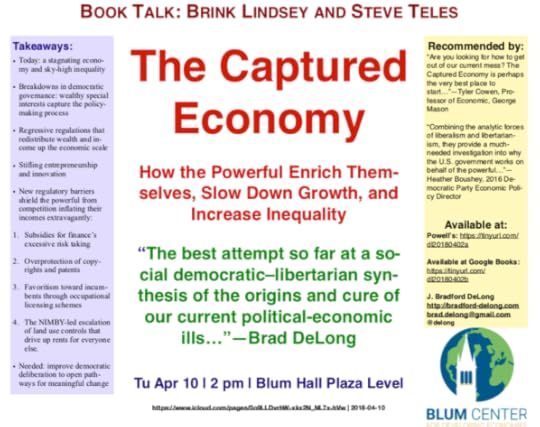
���The best attempt so far at a social democratic���libertarian synthesis of the origins and cure of our current political-economic ills���������Brad DeLong
The Captured Economy: How the Powerful Enrich Themselves, Slow Down Growth, and Increase Inequality
Brink Lindsey and Steve Teles
Niskanen Center: https://niskanencenter.org
"A compelling and original argument about one of the most pressing issues of our time, The Captured Economy challenges readers to break out of traditional ideological and partisan silos and confront the hidden forces that are strangling opportunity in the contemporary United States."���Matthew Yglesias http://vox.com
"Are you looking for how to get out of our current mess? The Captured Economy is perhaps the very best place to start."���Tyler Cowen, Professor of Economics, George Mason University
"American politics is mired in endless arguments about how much downward redistribution we want and how to provide it. But as Brink Lindsey and Steven Teles point out in this engaging, powerfully argued book, the reality of our political economy often looks much more like upward redistribution. In one arena after another, public policy enriches the already rich and advantages the already advantaged."���Yuval Levin, editor of National Affairs
"Steven Teles and Brink Lindsey ask one of the most important questions of our times: What are the political reforms we need to reduce the ability of the wealthy to maintain their capture of our government? Combining the analytic forces of liberalism and libertarianism, they provide a much-needed investigation into why the U.S. government works on behalf of the powerful and the steps we can take to address rising inequality and regressive regulation so that it instead acts in the public interest."���Heather Boushey, Democratic Economic Policy Director, 2016
Available at Powell���s: https://tinyurl.com/dl20180402a
Available at Google Books: https://tinyurl.com/dl20180402b
Takeaways:
Today: a stagnating economy and sky-high inequality
Breakdowns in democratic governance: wealthy special interests capture the policymaking process
Regressive regulations that redistribute wealth and income up the economic scale
Stifling entrepreneurship and innovation
New regulatory barriers shield the powerful from competition inflating their incomes extravagantly:
Subsidies for finance���s excessive risk taking
Overprotection of copyrights and patents
Favoritism toward incumbents through occupational licensing schemes
The NIMBY-led escalation of land use controls that drive up rents for everyone else.
Needed: improve democratic deliberation to open pathways for meaningful change
Synopsis
For years, America has been plagued by slow economic growth and increasing inequality. Yet economists have long taught that there is a tradeoff between equity and efficiency-that is, between making a bigger pie and dividing it more fairly. That is why our current predicament is so puzzling: today, we are faced with both a stagnating economy and sky-high inequality.
In The Captured Economy , Brink Lindsey and Steven M. Teles identify a common factor behind these twin ills: breakdowns in democratic governance that allow wealthy special interests to capture the policymaking process for their own benefit. They document the proliferation of regressive regulations that redistribute wealth and income up the economic scale while stifling entrepreneurship and innovation. When the state entrenches privilege by subverting market competition, the tradeoff between equity and efficiency no longer holds.
Over the past four decades, new regulatory barriers have worked to shield the powerful from the rigors of competition, thereby inflating their incomes-sometimes to an extravagant degree. Lindsey and Teles detail four of the most important cases: subsidies for the financial sector's excessive risk taking, overprotection of copyrights and patents, favoritism toward incumbent businesses through occupational licensing schemes, and the NIMBY-led escalation of land use controls that drive up rents for everyone else.
Freeing the economy from regressive regulatory capture will be difficult. Lindsey and Teles are realistic about the chances for reform, but they offer a set of promising strategies to improve democratic deliberation and open pathways for meaningful policy change. An original and counterintuitive interpretation of the forces driving inequality and stagnation, The Captured Economy will be necessary reading for anyone concerned about America's mounting economic problems and the social tensions they are sparking.

April 1, 2018
Macroeconomics: How Large Is the Shadow Cast by Recessions?
Macroeconomics: How Large Is the Shadow Cast by Recessions?
https://www.icloud.com/keynote/0-rKMXUoFYubeD2FVgezAd8kg http://www.bradford-delong.com/2018/04/macroeconomics-how-large-is-the-shadow-cast-by-recessions.html
J. Bradford DeLong and Lawrence H. Summers (1988): On the Existence and Interpretation of the "Unit Root" in U.S. GNP http://delong.typepad.com/unit_root.pdf
Danny Yagan (2017): Employment Hysteresis from the Great Recession http://delong.typepad.com/w23844.pdf
Christina Romer and David Romer (2017): Why Some Times Are Different: Macroeconomic Policy and the Aftermath of Financial Crises http://www.nber.org/papers/w23931
J. Bradford DeLong and Lawrence H. Summers (2012): Fiscal Policy in a Depressed Economy https://www.brookings.edu/bpea-articles/fiscal-policy-in-a-depressed-economy
J. Bradford DeLong (2018): Notes on Gerald Friedman https://www.icloud.com/pages/0n7dprWN7e0ZqfoYxNytgBEwg
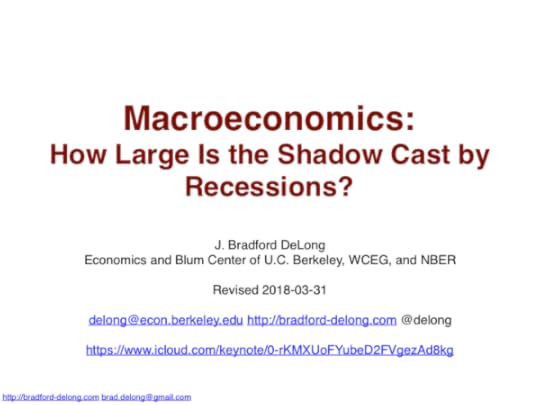
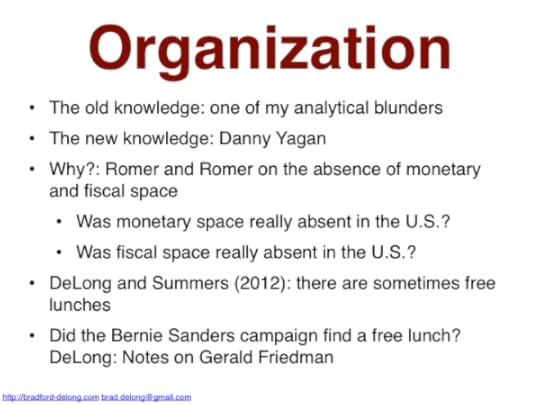
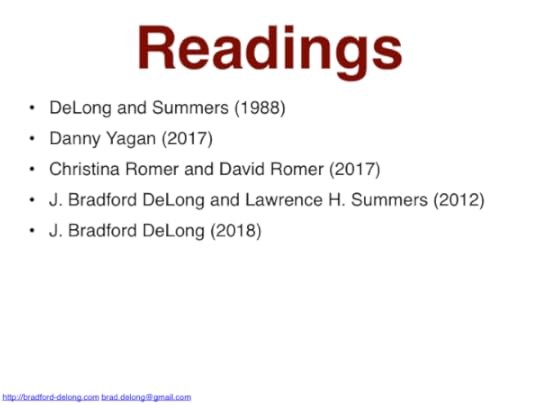
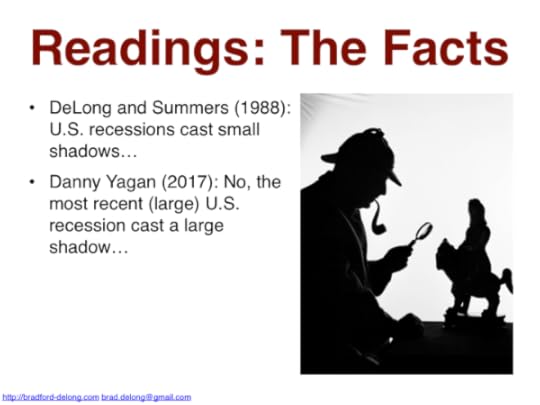
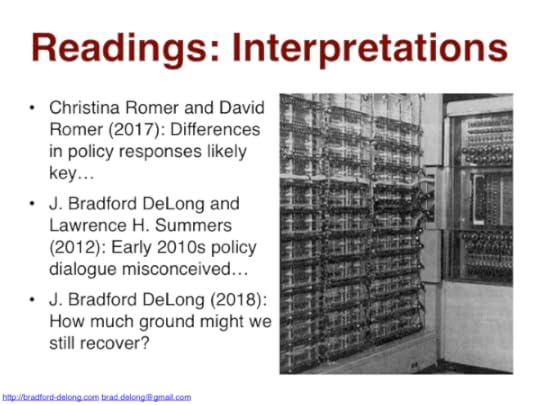
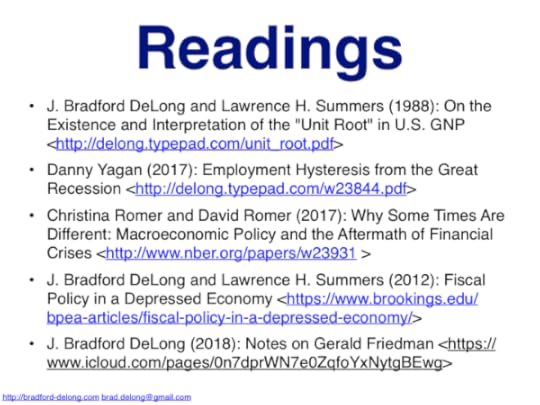
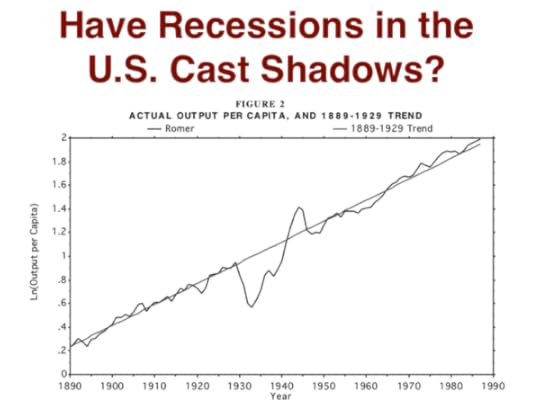
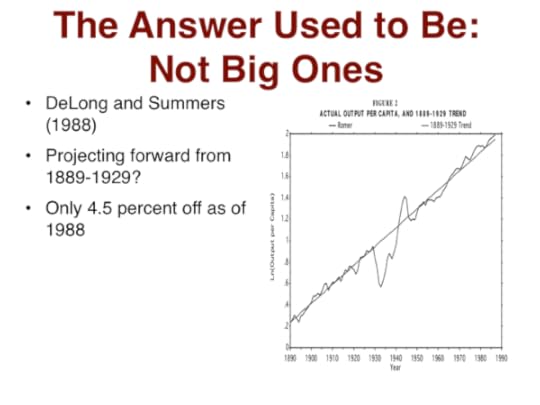
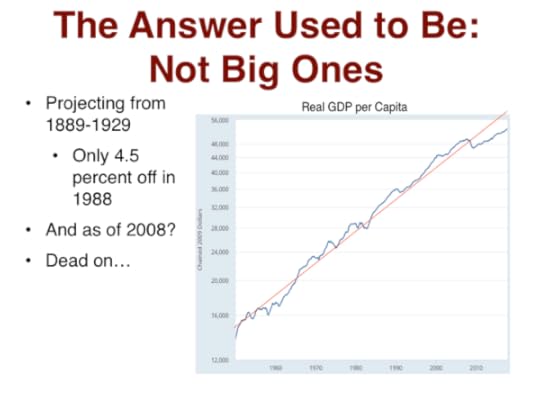
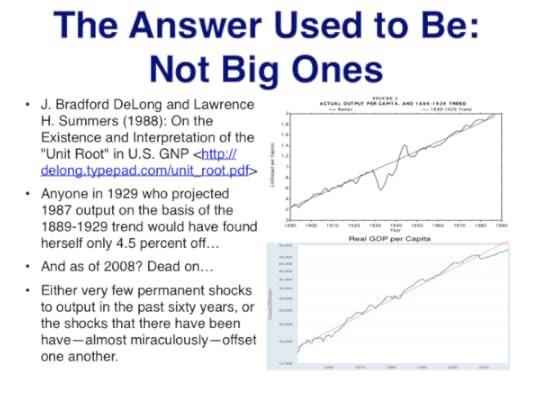
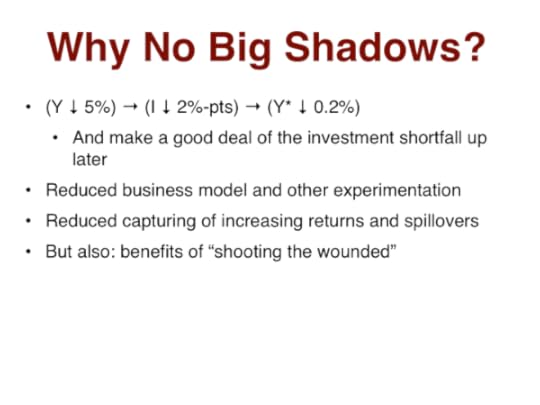
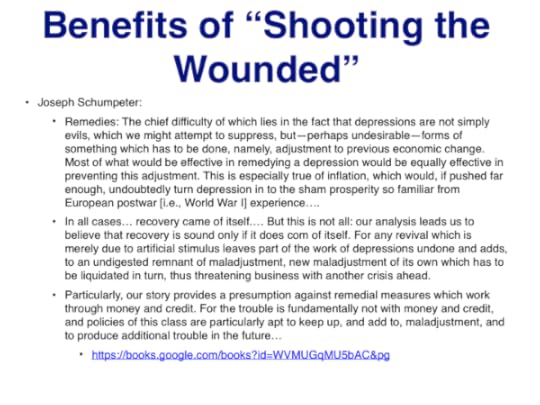
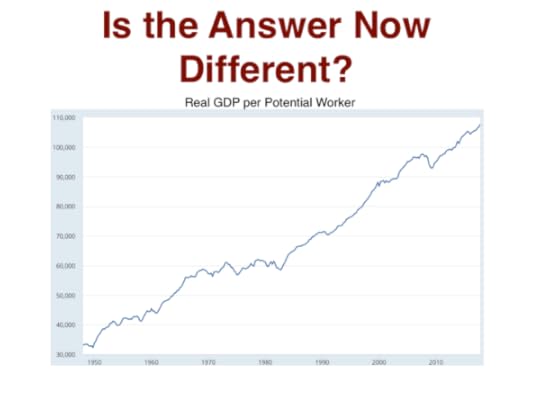
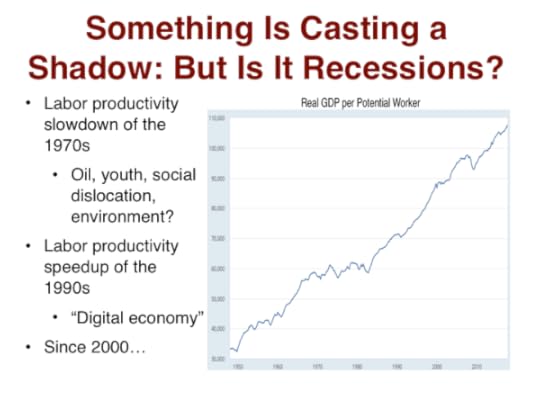
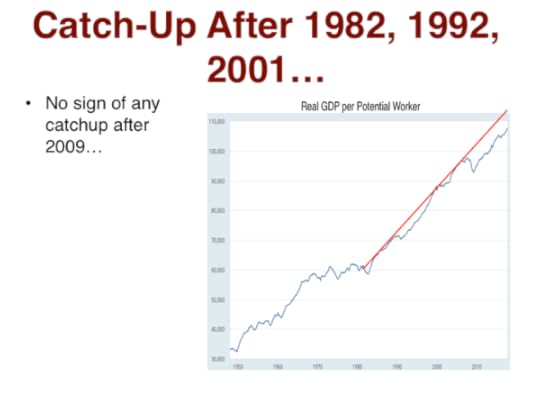
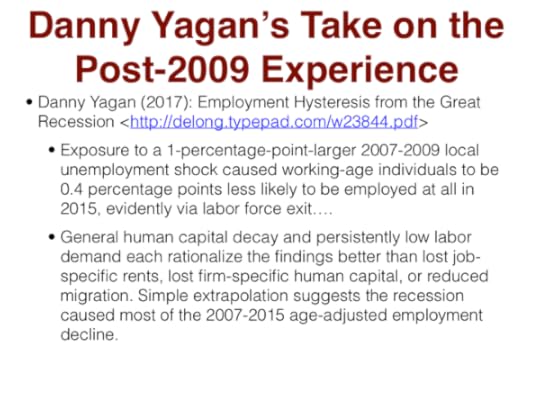
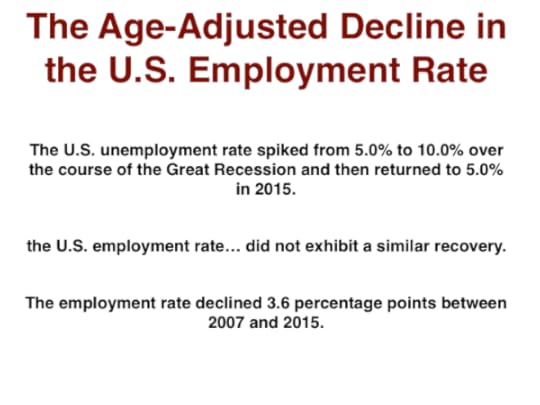
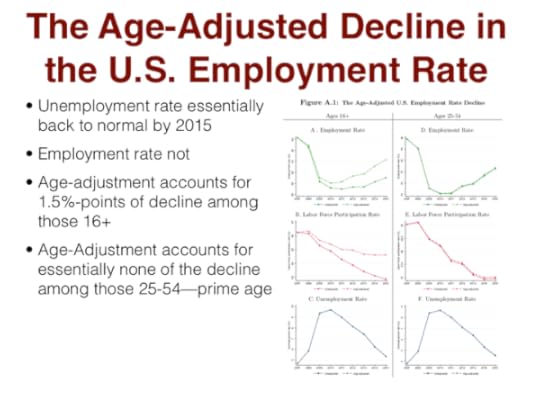
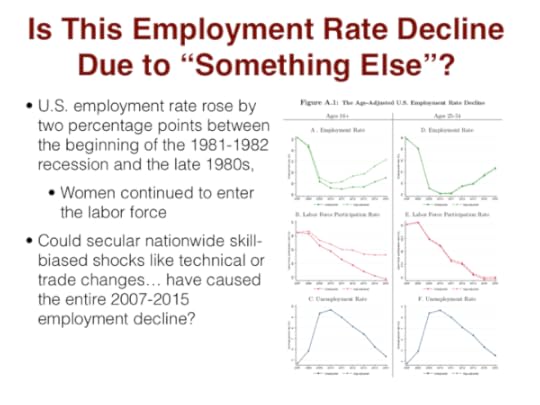
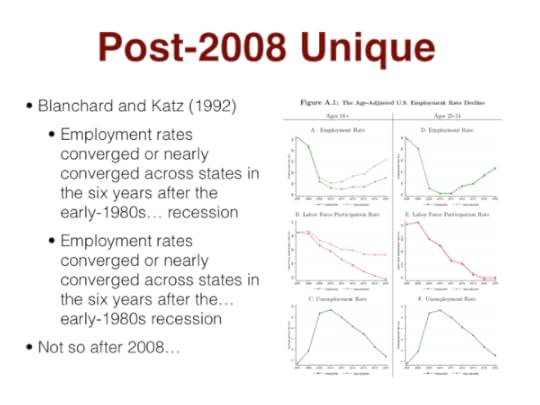
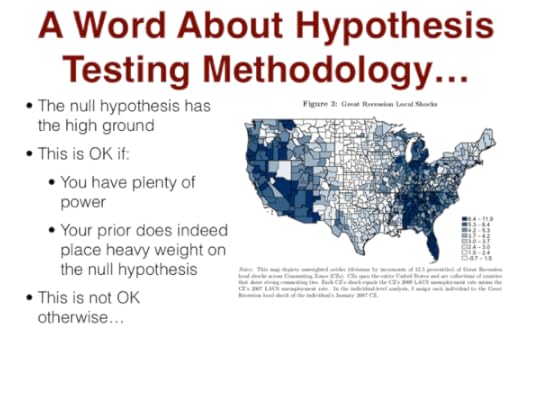
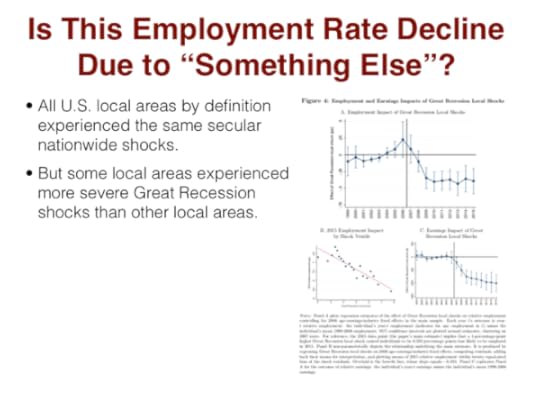
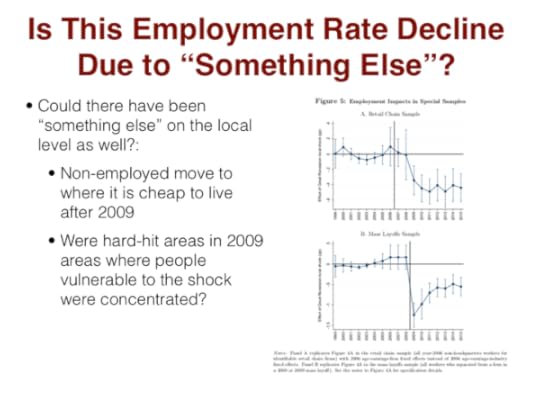
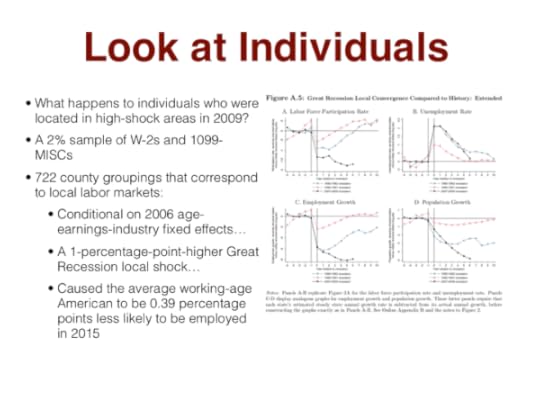
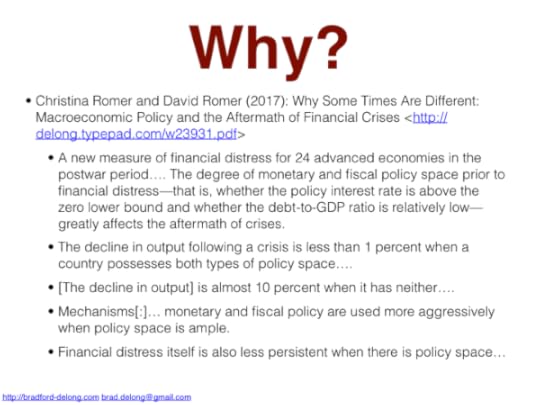
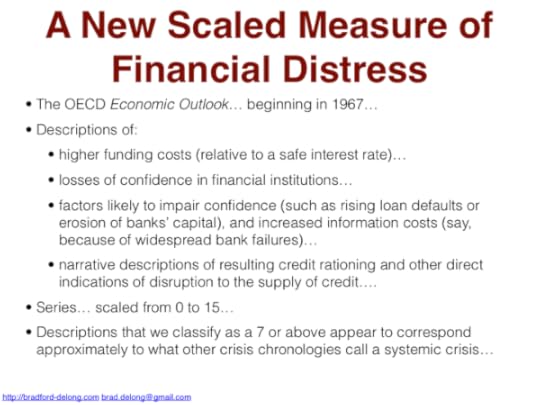
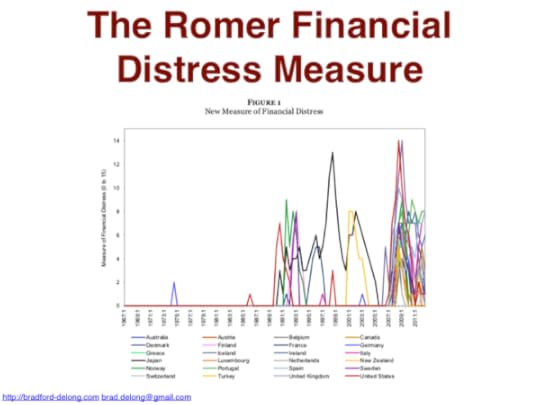
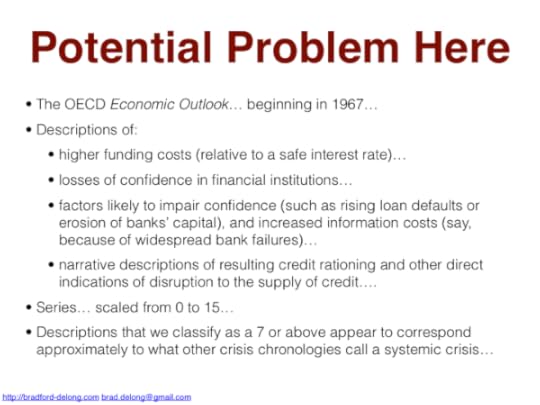
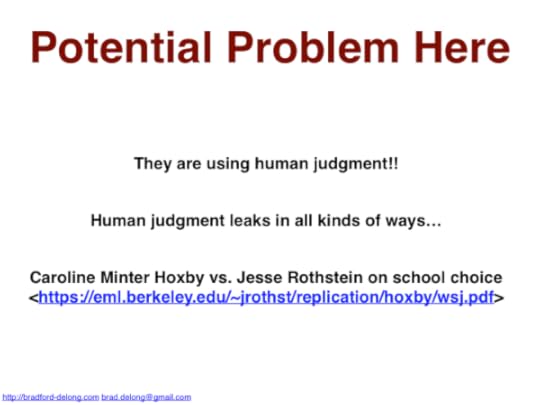

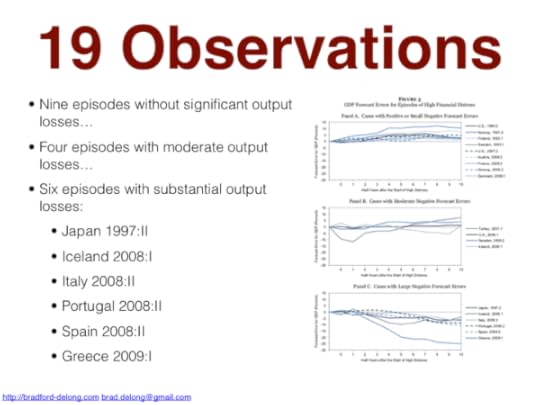
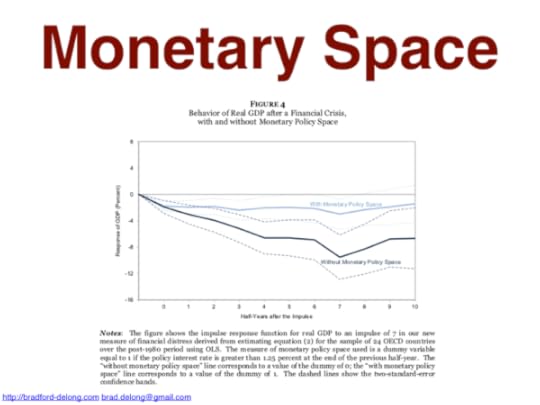
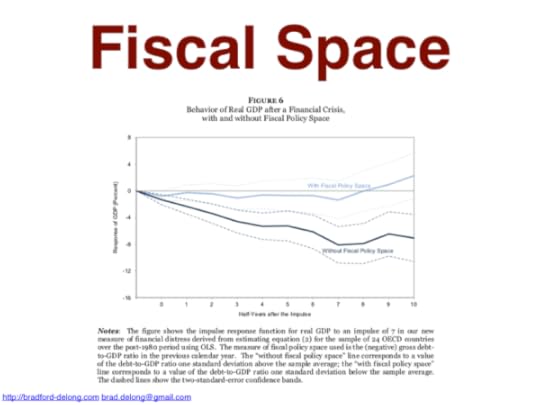
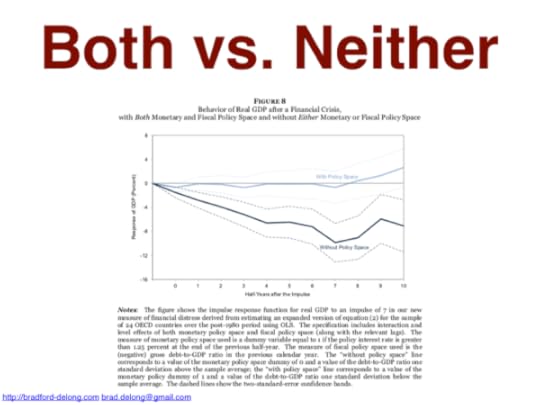
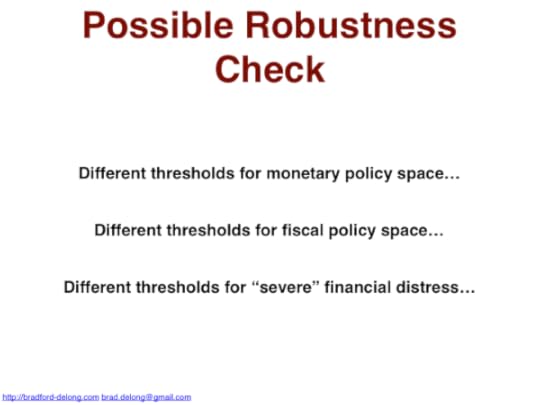
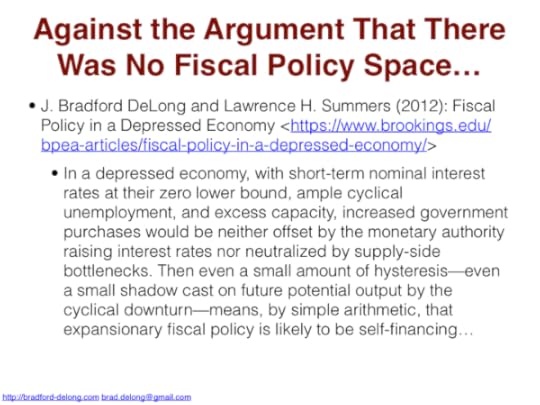
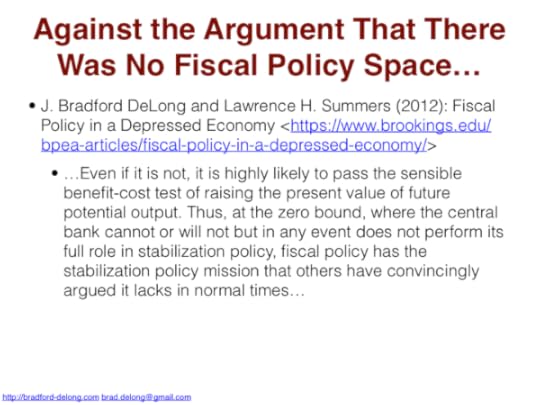
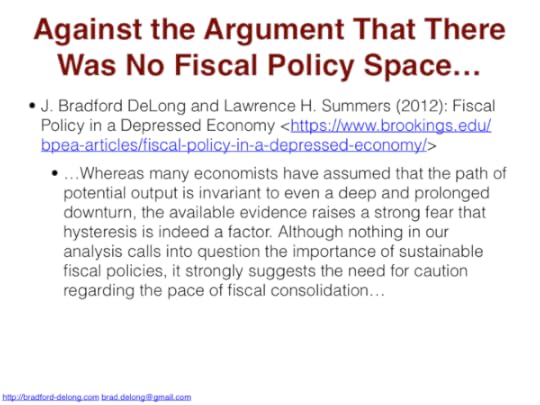

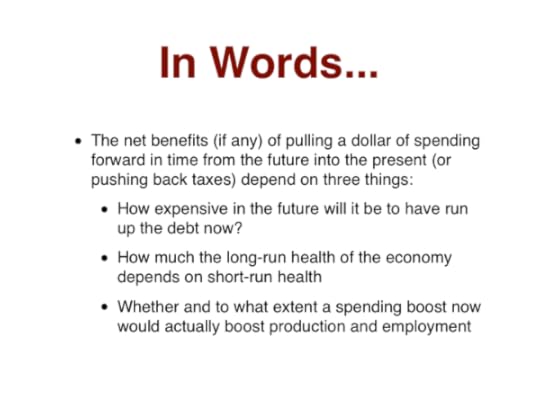
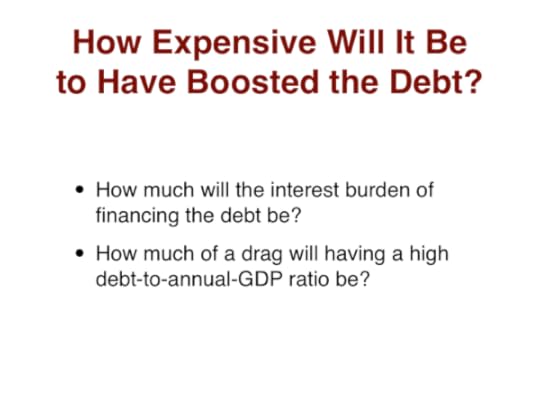
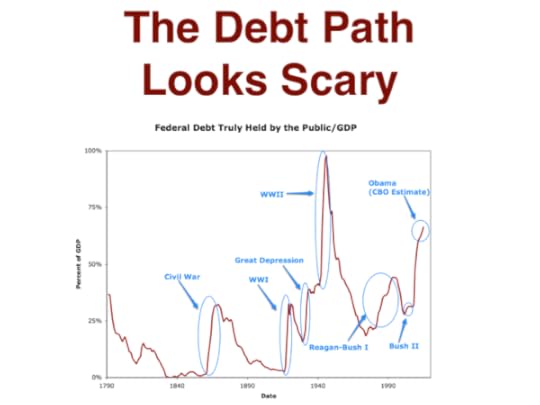
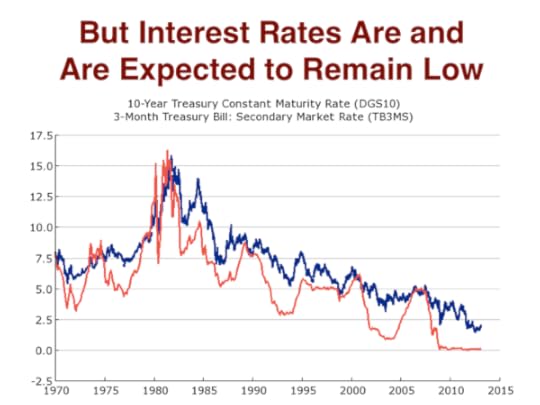
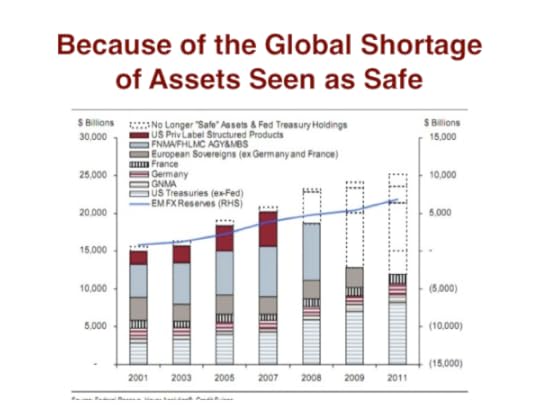
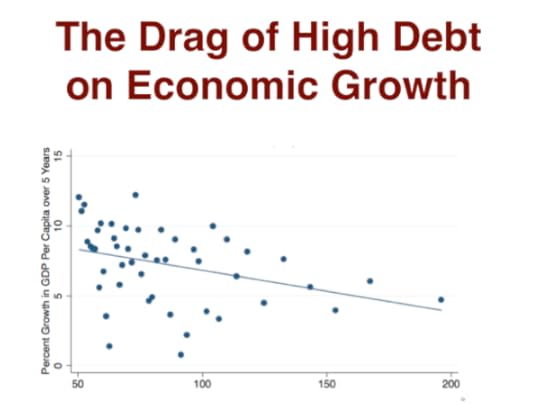
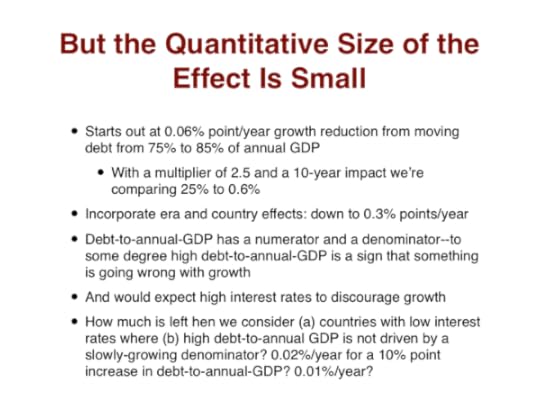
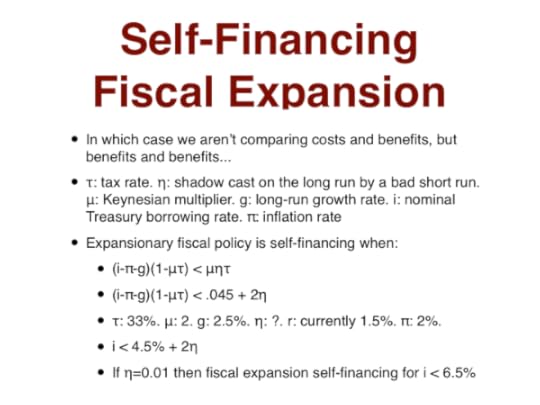
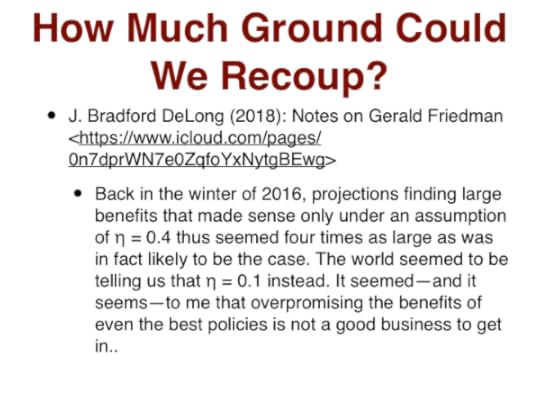
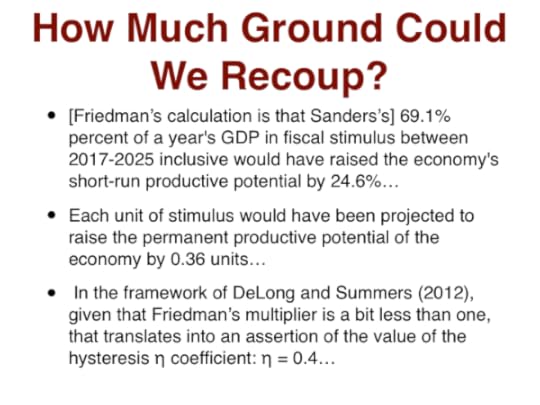
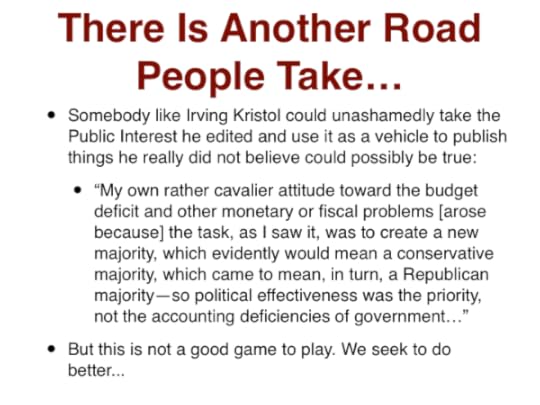
This File: http://www.bradford-delong.com/2018/04/macroeconomics-how-large-is-the-shadow-cast-by-recessions.html
Edit This File: http://www.typepad.com/site/blogs/6a00e551f08003883400e551f080068834/post/6a00e551f08003883401b7c95d10f6970b/edit
Keynote: https://www.icloud.com/keynote/0-rKMXUoFYubeD2FVgezAd8kg
March 31, 2018
Live from the Antebellum Plantation: Brian Fennessy: "Gav...
Live from the Antebellum Plantation: Brian Fennessy: "Gavin Wright keeping the slave-capitalism debate lively: slavery was profitable to slaveholders but it kept the region underdeveloped and claims about its centrality to US Econ growth are exaggerated! #DukeMonumentsSymposium...
...Josh Clark Davis: He strangely criticizes book for "aggregat[ing] real and slave property" + purportedly ignoring that "the South was the wealthiest region in the nation when slave values are included, but the poorest when they are not."
Brian Fennessy:You can���t exclude slave property when calculating wealth. But is that then an accurate measure of comparative regional and national development? Southern land values lagged drastically behind. It depends on which question you���re trying to answer.
I actually think you should exclude slave property when calculating regional wealth. It's an asset to the owner. It's a liability to the slave. Those sum to zero���and if one is working in utility rather than wealth space those sum to something large and negative. Individuals can be made wealthy by slave property. Any group that includes both Master and slave���and any region in which both live���cannot be counted wealthy thereby...
Note to Self: Be the Twitter you want to see in the world...
Note to Self: Be the Twitter you want to see in the world...
Do We Really Care Whether the Profits from American Slavery Were Reinvested to Spur Faster American Economic Growth or Not?

Do We Really Care Whether the Profits from American Slavery Were Reinvested to Spur Faster American Economic Growth or Not?
Brian Fennesey: "Gavin Wright keeping the slave-capitalism debate lively: Slavery was profitable to slaveholders but it kept the region underdeveloped and claims about its centrality to US economic growth are exaggerated! #DukeMonumentsSymposium...
...James DeWolf Perry: A tough argument to make. Slavery brought enormous wealth to the South. And slavery's centrality to the U.S. economy is hard to deny: its products were a substantial fraction of U.S. economic output, and were vital to northern industrialization.
Slavery brought enormous wealth to white slaveholders. But they did not invest it in their country���they spent it. Thus slaveholder profits were not essential to boosting U.S. economic growth.
Slavery also brought substantial comfort to purchasers of cotton textiles and other slave-grown products. But here, again, most of this wealth went to boost the standard of living of those who directly benefitted, not to fuel faster economic growth.
The place where American slavery mattered for economic growth in Britain, New England, and the rest of the North Atlantic is indeed in the spur it provided to boosting investment in cotton textile technologies, and in the subsequent spillovers of the technologies developed from that experience elsewhere: practice making machine tools to make textile machinery meant that down the road the machine shops could make better machines, etc. But cotton textiles were only 1 of the Big Four sectors of the Industrial Revolution. The others were:
wool textiles,
locomotives and other uses of steampower, and
rails and other uses of iron were the others.
Plus there were important innovative sectors outside the Big Four as well.
Figure that 1/5 of the upward leap of the Industrial Revolution came from slavery. Hobsbawm said: "He who says industrialization says 'cotton'", but that it is only 1/5 of the word cloud���he who says "industrialization" says many other things too.
Perhaps the brutalization of American slaves turned a 50-year process into a 40-year process.
That said, cutting 10 years off of the time for industrialization ain't chickenfeed.
And that said, that slavery was not "essential" to the Industrial Revolution makes the murder, torture, and torment of persons enslaved on the plantations look not better but worse. You can plead "but this horrible process created a brighter future for everyone" as a partial mitigation before the Bar of History. To plead "but it did not make that much difference in the long run���we lived high and the hog and did not pass any of the benefits down the generations" makes the slaveholder (and slave labor consumer) generations look worse, not better at all.
It mattered a lot for persons enslaved. It matters a lot for their descendants. It matters a lot because of their additional descendants who never got the chance to exist but would have otherwise. It does not matter less in any sense because people alive today are not principal profiteers from the peculiar institution of plantation slavery.
J. Bradford DeLong's Blog
- J. Bradford DeLong's profile
- 90 followers



